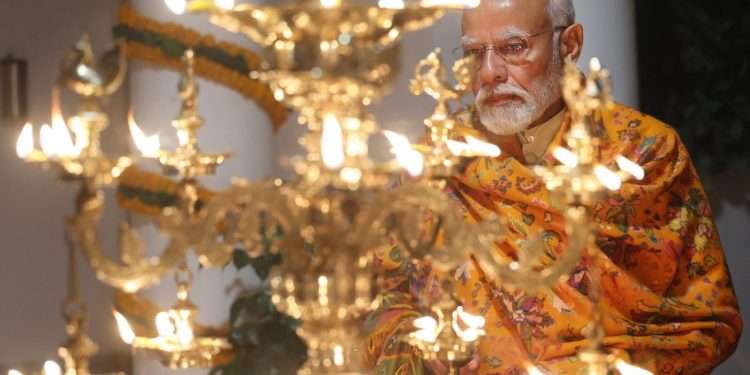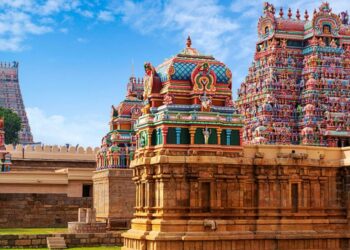The consecration of the yet-to-be-completed Ram temple in Ayodhya on January 22 sends a clear message that India is now a majoritarian Hindu state, where others, especially Muslims, will have to settle for second-class citizenship. Coming just a few months before the general elections, the political significance of the supposedly spiritual event, with Prime Minister Narendra Modi donning the mantle of Prime-Devotee will not be lost on the electorate.
Just four days after the Ayodhya event, India will observe its 74th Republic Day, which is supposed to be an annual commemoration of its acclaimed secular Constitution but has morphed over the years into a jingoistic display of the country’s armed prowess. The Modi government is sure to celebrate that event also with gusto, without a trace of irony that it has hollowed out the essence of the Constitution during its nine-plus years in office.
The truth is that neither event represents the priorities of a majority of Indians, who wish to live in peace with their neighbours and are worried about jobs, food security and education for their children. But the events will serve notice to the world that India’s cherished values as enshrined in its Constitution will come to a rapid end if Modi is re-elected for a third term in May.
Liberty for supporters, jail for dissenters
BR Ambedkar, addressing the Constituent Assembly in 1949, described liberty, equality, and fraternity as “the principles of life…which cannot be divorced from each other….without equality, liberty would produce the supremacy of the few over the many”.
He was prescient.
The Modi government has amply demonstrated that its version of liberty and free speech apply only to its supporters and that it will not brook any criticism of its rule: Hindutva leaders accused of rape, murder, and incitement to violence – even open calls for the mass murder of Muslims – are roaming free, while dissenters constantly face the risk of being hauled up on trumped up charges.
In an alarming new development, the long arm of the Indian government is now reaching across the seas to shut down dissenters in the diaspora by any means necessary, including blocking their social media accounts in India, doxing, threats of lawsuits through proxies, and even assassination of its adversaries.
Transnational repression, it would seem, has now become one of the tools of the Indian government.
The US Commission on International Religious Freedom has repeatedly documented the wide-spread incitement and violence against religious minorities and the unequal application of law under Modi’s rule. Its 2023 report, once again calling on the Joe Biden administration to designate India as a Country of Particular Concern, could not have been more damning.
The mountain of evidence presented over the years by the commission, the State Department, and several other independent groups, leave little doubt that Modi’s rule has indeed resulted in the “supremacy of the few over the many”, as Ambedkar warned.

The Biden betrayal
Indian immigrants from the 1960s, like me, have witnessed many ups and downs in US-India relations over the years. US Secretary of State Henry Kissinger’s infamous tilt towards Pakistan in 1971, as India faced a massive refugee crisis from former East Pakistan, is still etched in our collective memory. We remember Prime Minister Indira Gandhi’s visit with President Ronald Reagan in 1982 and her post-visit disillusionment as the US poured aid and arms into Pakistan. The US sanctions regime, in reaction to India’s nuclear test in Pokhran under Prime Minister Atal Bihari Vajpayee, was a low point in our relations.
Thankfully, US-India relations saw an unprecedented positive boost under the George W Bush and Bill Clinton presidencies, coinciding with the ascendancy of India’s “Silicon Valleys”.
President Donald Trump’s embrace of Modi, on the other hand, was not based on mutual respect for our democracies, but as a fellow traveler with similar cynical views of democracy and minority rights. Trump also saw his support for Modi as a means of garnering Indian-American votes for himself.
When Biden was elected in 2020, many in the community assumed that he would reset US-India policy back to the heydays of the Clinton presidency. Much to our disappointment, he has not only doubled-down on the Modi-centric policy of Trump, but has also betrayed his own campaign promise to make human rights and religious freedom a major part of his foreign policy.
“Silence is complicity”, candidate Biden often proclaimed. In the case of India, he and Secretary of State Antony Blinken have gone beyond just silence to dishonestly describe India as “a thriving democracy”. Their rejection, year after year, of the US Commission on International Religious Freedom recommendation to designate India as a Country of Particular Concern, has set a new precedent of the US government siding with a foreign government against its own respected institutions. This does not bode well.
Unless Biden changes course, history will record that his India policy was the most damaging of all our presidents and will judge him as an active participant in the dismantling of Indian democracy.
What next for those who care?
First-generation immigrants from India like myself came to the US in search of higher education and employment opportunities. We were not running away from a failed democracy or a dictatorship, and we never gave up on Indian democracy despite its many deficiencies. But never did we imagine that the US government would someday become an enabler of an authoritarian, theocratic regime in India.
Given the political clout of Modi supporters in America, and the US government’s refusal to publicly acknowledge India’s ground realities, Indian-Americans who care for Indian democracy have only one option left to do their bit to rescue Indian democracy: appeal to the wider American public to underscore the disturbing parallels between Hindu supremacy and White supremacy and form broader alliances with civil society groups who are fighting similar battles in other arenas against hate, bigotry, and supremacy of all kinds.
We must emphasise that the collapse of the world’s largest democracy will have far-reaching consequences for democracies around the world, including our own fragile democracy.
Republished from The Scroll.











